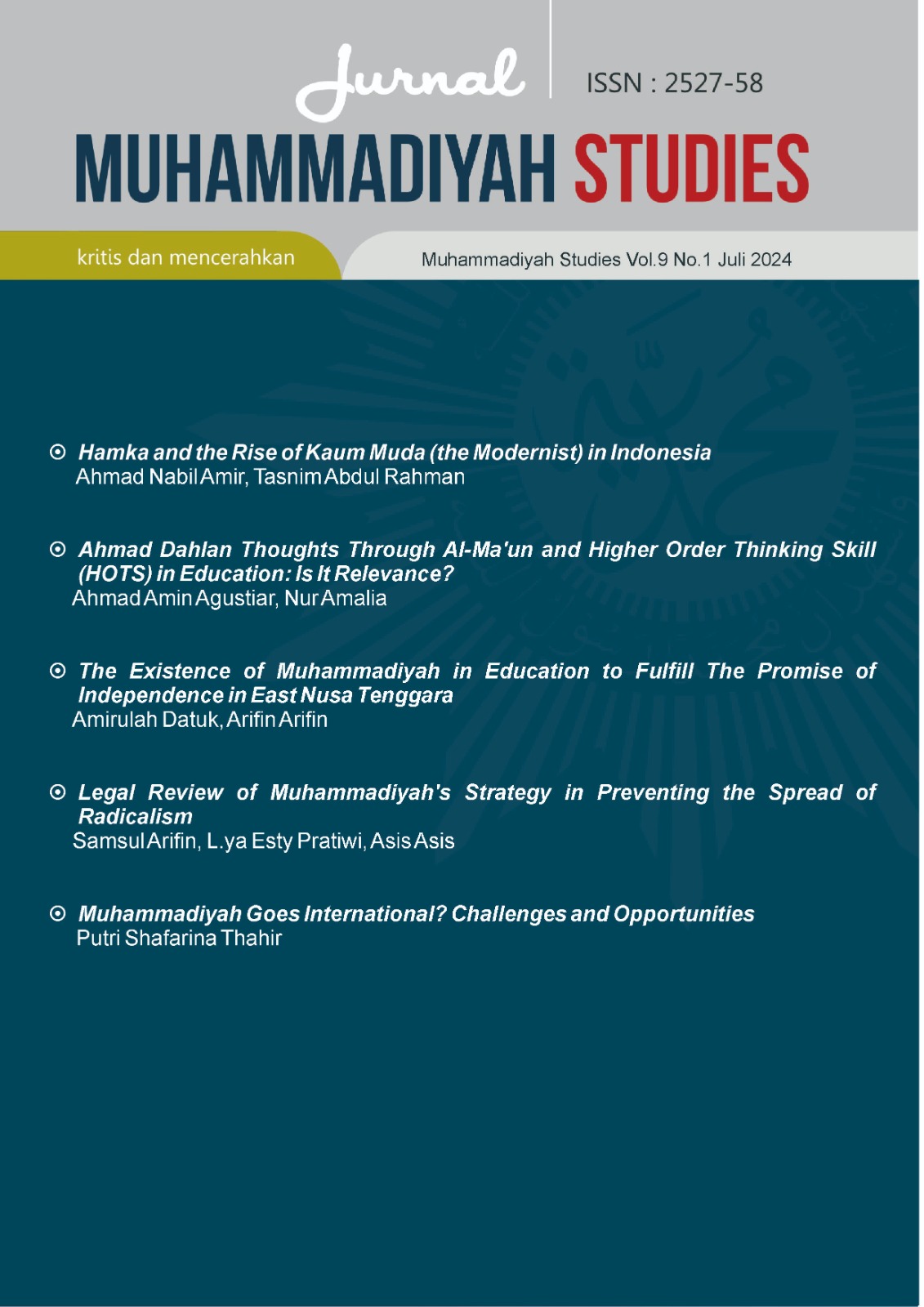Muhammadiyah Goes International? Challenges and Opportunities
DOI:
https://doi.org/10.22219/jms.v9i1.36120Keywords:
Role; Contribution; Muhammadiyah; International; Relation.Abstract
The idea of Muhammadiyah internationalization emerged as a response to the phenomenon of globalization, where Muhammadiyah tried to ensure that its da'wah movement was in line with the conditions of the times. This approach also includes global social issues such as the fate of workers, gender inequality, nuclear issues, and the environment. Muhammadiyah has a high commitment to the values of Pancasila and tries to contribute to achieving Indonesia's national ideals as stated in the Preamble to the 1945 Constitution. In the international context, Muhammadiyah not only plays a role as an Islamic movement but also as a socio-Islamic movement that tries to respond to various global issues. This article discusses how Muhammadiyah tries to develop the concept of peaceful Islamic da'wah amidst the complexity of the international world. Furthermore, it explains how Muhammadiyah's role in international relations involves active participation in conflict resolution, peacebuilding, and humanitarian activities in various countries. Muhammadiyah's internationalization strategy is explained through programs such as sending its best cadres abroad, establishing schools and charitable efforts in various countries, and participating in international forums. The author also discusses the concept of Muhammadiyah internationalization in three dimensions, namely ideas, roles, and movements. The idea of internationalization involves global socialization of the character of the Muhammadiyah movement and teachings. The role of internationalization includes increasing the role of Muhammadiyah in international forums, such as humanitarian missions, peace, and social activities. Meanwhile, the internationalization of the movement aims to make Muhammadiyah a model of Islamic practice that can be adopted globally. Furthermore, this article describes how Muhammadiyah, as an Islamic movement in Indonesia, is actively involved in the dynamics of the international world to encourage the transformation of the role of religions in overcoming global problems. Through internationalization, Muhammadiyah seeks to be part of a global movement that brings enlightenment, promotes Islam as a religion of peace, and contributes to the development of world civilization.
Downloads
References
Al-Fatih, Sholahuddin. Perkembangan Metode Penelitian Hukum Di Indonesia - Sholahuddin Al-Fatih - Google Buku. 1st ed. Vol. 1. Malang: UMM Press, 2023. https://books.google.co.id/books/about/Perkembangan_Metode_Penelitian_Hukum_di.html?id=EObiEAAAQBAJ&redir_esc=y.
Anggraeni, Leni. “Deradicalization in Higher Education: How to Make It Work?” In Research for Social Justice, 25–29. Routledge, 2019.
Azizah, Nurul, Erry Nurdianzah, Mirza Mahbub Wijaya, Tomi Azami, and Anas Rohman. “Religious Moderation in The Industrial Era 4.0: Deradicalization Through The Development of Intellectual Traditions at Fadhlul Fadhlan Islamic Boarding School Semarang.” Jurnal Pendidikan Agama Islam 20, no. 2 (2023): 233–46.
Bilqis Rihadatul Aisy, Et al. “Penegakan Kontra Radikalisasi Melalui Media Sosial Oleh Pemerintah Dalam Menangkal Radikalisme.” Jurnal Hukum Magnum Opus 2, no. 1 (2019): 5.
Fatoni, Syamsul. “Pembaruan Regulasi Terorisme Dalam Menangkal Radikalisme Dan Fundamentalisme.” Al-Tahrir: Jurnal Pemikiran Islam 18, no. 1 (2018): 219–41.
Firmansyah, Firmansyah, and Arief Hidayat. “Pendekatan Advokasi Muhammadiyah Dalam Penanganan Terorisme Di Indonesia.” Journal of Political Issues 2, no. 1 (2020): 10–20.
Hilmy, Masdar. “Radikalisme Agama Dan Politik Demokrasi Di Indonesia Pasca-Orde Baru.” MIQOT: Jurnal Ilmu-Ilmu Keislaman 39, no. 2 (2015): 407–25.
Irwansyah. PENELITIAN HUKUM Pilihan Metode Dan Praktik Penulisan. Edited by Ahsan Yunus. Yogyakarta: Mirra Buana Media, 2023.
Jayadi, H Mahsun. “Muhammadiyah Sebagai Gerakan Tajrid Dan Tajdid.” Perwira Media Nusantara (PMN), n.d.
Ludigdo, Unti, and Ali Mashuri. “Negative Evaluations of National Ethics and Its Impact on Islamic Radicalism.” SAGE Open 11, no. 3 (2021): 21582440211041100.
Maimun, Maimun, and Mawardi Mawardi. “Analisis Maqasid Asy-Syari’ah Terhadap Radikalisme Keagamaan Di Indonesia.” As-Siyasi: Journal of Constitutional Law 1, no. 1 (2021): 1–28.
Malik, Abdul dkk. “Kultur Pendidikan Pesantren Dan Radikalisme.” Jurnal Pembangunan Pendidikan: Fondasi Dan Aplikasi 4, no. 2 (2017): 103. https://doi.org/10.21831/jppfa.v4i2.11279.
Miswanto, Agus, and M Zuhron Arofi. “Sejarah Islam Dan Kemuhammadiyahan.” Magelang: P3SI UMM, 2012.
Nurish, Amanah. “Muhammadiyah Dan Arus Radikalisme.” Maarif 14, no. 2 (2019): 59–74.
Romadon, Saiful, and Ade Budi Santoso. “Manajemen Krisis Public Relations Pondok Pesantren Dalam Merespon Isu Radikalisme Dan Terorisme (Studi Kasus Pada Pondok Pesantren Nurussalam Desa Kujang Kabupaten Ciamis).” Akrab Juara: Jurnal Ilmu-Ilmu Sosial 4, no. 4 (2019): 121–32.
Sary, Noermala. “Mencegah Penyebaran Paham Radikalisme Pada Sekolah.” Manthiq 2, no. 2 (2017): 191–200.
Satria Unggul, Et.al. “Patterns Of Spreading Radicalism In Muhammadiyah Islamic Boarding Schools In East Java.” PETITA: Jurnal Kajian Ilmu Hukum Dan Syariah 6, no. 2 (2021).
Sukabdi, Zora A. “Deradikalisasi Mantan Narapidana Terorisme: Studi Kasus MW Alias WG.” Journal of Terrorism Studies 3, no. 2 (2021): 2.
UMA, Sosial Politik. “Perkembangan Amal Usaha Organisasi Muhammadiyah Di Bidang Pendidikan Dan Kesehatan.” Jurnal Ilmu Pemerintahan Dan Sosial Politik 1, no. 2 (2013): 101–11.
Downloads
Published
How to Cite
Issue
Section
License
Copyright (c) 2024 Putri Shafarina Thahir

This work is licensed under a Creative Commons Attribution 4.0 International License.
Copyright Notice
Authors who publish with Jurnal Muhammadiyah Studies agree to the following terms:
- For all articles published in the Jurnal Muhammadiyah Studies, copyright is retained by the authors. Authors give permission to the publisher to announce the work with conditions. When the manuscript is accepted for publication, the authors agree to the automatic transfer of the publishing right to the publisher.
- Authors retain copyright and grant the journal the right of first publication with the work simultaneously licensed under a Creative Commons Attribution 4.0 International License. that allows others to share the work with an acknowledgment of the work's authorship and initial publication in this journal.
- Authors are able to enter into separate, additional contractual arrangements for the non-exclusive distribution of the journal's published version of the work (e.g., post it to an institutional repository or publish it in a book), with an acknowledgment of its initial publication in this journal.
- Authors are permitted and encouraged to post their work online (e.g., in institutional repositories or on their website) prior to and during the submission process, as it can lead to productive exchanges, as well as earlier and greater citation of published work (See The Effect of Open Access).




